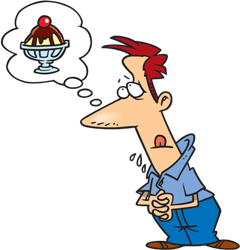Dynamic
"Dinámico" es un adjetivo que significa que algo se está moviendo o cambiando.
En la gramática inglesa, un "verbo dinámico" significa que el verbo describe una acción en lugar de un estado. Los verbos dinámicos a veces se conocen como "verbos de acción".
"Joe is chasing the bus."
- love
- hate
- like
- prefer
- doubt
- seem
- know
- own
- understand
Stative
"Stative" es un adjetivo que describe algo como tener un estado o existir (este es un adjetivo muy poco común).
En la gramática inglesa, un "verbo estático" significa que el verbo describe un estado en lugar de una acción.
Los verbos estativos a veces se conocen como "verbos de estado".
"Kevin wants some ice-cream."
eat
walk
learn
grow
sleep
talk
write
run
read
become
go
Example sentences with dynamic verbs:
- "I can't talk right now, I'm eating dinner."
Present progressive used to describe an action happening now. - "Sorry, I'm out of breath because I've been running."
Present perfect progressive used to describe an action that started in the past, continued for some time and has results now. - "I didn't steal the necklace! I was sleeping when someone broke into the shop!"
Past progressive used to talk about an action that was happening at a particular time in the past.
Example sentences with static verbs:
- "I think it is wrong to hit children."
Here, think is a stative verb. It means "to have an opinion" and it cannot be used in the progressive form in this case.
B
"I'm thinking about buying a new car."
Here, thinking is describing a process, or an action. This is something that is happening, rather than simply being. So here we can use the progressive form. - "I don't mind if we watch a movie tonight."
Here, mind means "be bothered by", which is a state of mind, not an action. Therefore, it is stative.
BUT
"I'm not being nosy. I'm minding my own business!"
Here, minding means "looking after" and is therefore a process and a dynamic verb. - "I have three brothers."
Have here talks about the family relationship the speaker has with her brothers and is therefore stative.
BUT
"I'm having a bad day today. I'll call you when things are better."
vídeo:




No hay comentarios:
Publicar un comentario